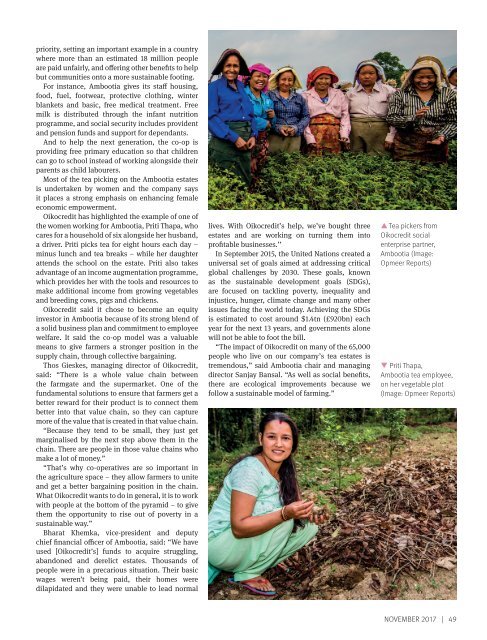November 2017
You also want an ePaper? Increase the reach of your titles
YUMPU automatically turns print PDFs into web optimized ePapers that Google loves.
priority, setting an important example in a country<br />
where more than an estimated 18 million people<br />
are paid unfairly, and offering other benefits to help<br />
but communities onto a more sustainable footing.<br />
For instance, Ambootia gives its staff housing,<br />
food, fuel, footwear, protective clothing, winter<br />
blankets and basic, free medical treatment. Free<br />
milk is distributed through the infant nutrition<br />
programme, and social security includes provident<br />
and pension funds and support for dependants.<br />
And to help the next generation, the co-op is<br />
providing free primary education so that children<br />
can go to school instead of working alongside their<br />
parents as child labourers.<br />
Most of the tea picking on the Ambootia estates<br />
is undertaken by women and the company says<br />
it places a strong emphasis on enhancing female<br />
economic empowerment.<br />
Oikocredit has highlighted the example of one of<br />
the women working for Ambootia, Priti Thapa, who<br />
cares for a household of six alongside her husband,<br />
a driver. Priti picks tea for eight hours each day –<br />
minus lunch and tea breaks – while her daughter<br />
attends the school on the estate. Priti also takes<br />
advantage of an income augmentation programme,<br />
which provides her with the tools and resources to<br />
make additional income from growing vegetables<br />
and breeding cows, pigs and chickens.<br />
Oikocredit said it chose to become an equity<br />
investor in Ambootia because of its strong blend of<br />
a solid business plan and commitment to employee<br />
welfare. It said the co-op model was a valuable<br />
means to give farmers a stronger position in the<br />
supply chain, through collective bargaining.<br />
Thos Gieskes, managing director of Oikocredit,<br />
said: “There is a whole value chain between<br />
the farmgate and the supermarket. One of the<br />
fundamental solutions to ensure that farmers get a<br />
better reward for their product is to connect them<br />
better into that value chain, so they can capture<br />
more of the value that is created in that value chain.<br />
“Because they tend to be small, they just get<br />
marginalised by the next step above them in the<br />
chain. There are people in those value chains who<br />
make a lot of money.”<br />
“That’s why co-operatives are so important in<br />
the agriculture space – they allow farmers to unite<br />
and get a better bargaining position in the chain.<br />
What Oikocredit wants to do in general, it is to work<br />
with people at the bottom of the pyramid – to give<br />
them the opportunity to rise out of poverty in a<br />
sustainable way.”<br />
Bharat Khemka, vice-president and deputy<br />
chief financial officer of Ambootia, said: “We have<br />
used [Oikocredit’s] funds to acquire struggling,<br />
abandoned and derelict estates. Thousands of<br />
people were in a precarious situation. Their basic<br />
wages weren’t being paid, their homes were<br />
dilapidated and they were unable to lead normal<br />
lives. With Oikocredit’s help, we’ve bought three<br />
estates and are working on turning them into<br />
profitable businesses.’’<br />
In September 2015, the United Nations created a<br />
universal set of goals aimed at addressing critical<br />
global challenges by 2030. These goals, known<br />
as the sustainable development goals (SDGs),<br />
are focused on tackling poverty, inequality and<br />
injustice, hunger, climate change and many other<br />
issues facing the world today. Achieving the SDGs<br />
is estimated to cost around $1.4tn (£920bn) each<br />
year for the next 13 years, and governments alone<br />
will not be able to foot the bill.<br />
“The impact of Oikocredit on many of the 65,000<br />
people who live on our company’s tea estates is<br />
tremendous,” said Ambootia chair and managing<br />
director Sanjay Bansal. “As well as social benefits,<br />
there are ecological improvements because we<br />
follow a sustainable model of farming.”<br />
p Tea pickers from<br />
Oikocredit social<br />
enterprise partner,<br />
Ambootia (Image:<br />
Opmeer Reports)<br />
q Priti Thapa,<br />
Ambootia tea employee,<br />
on her vegetable plot<br />
(Image: Opmeer Reports)<br />
NOVEMBER <strong>2017</strong> | 49


















